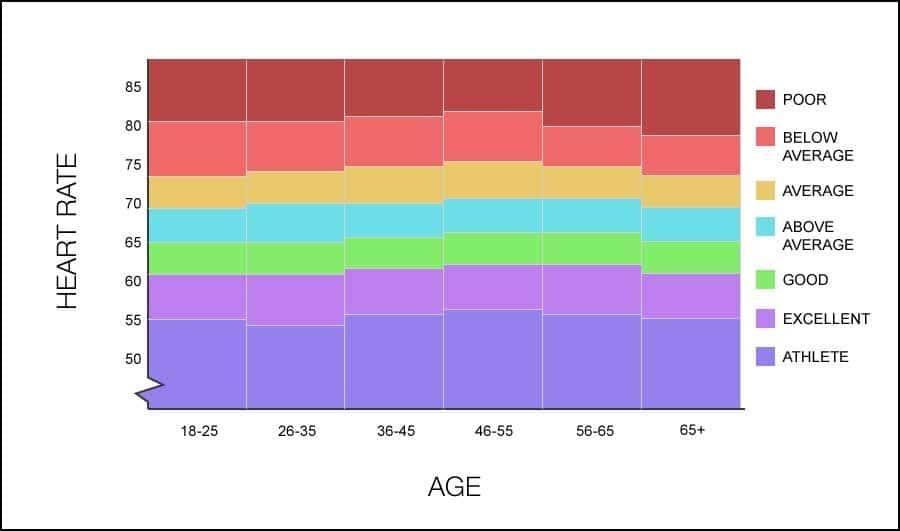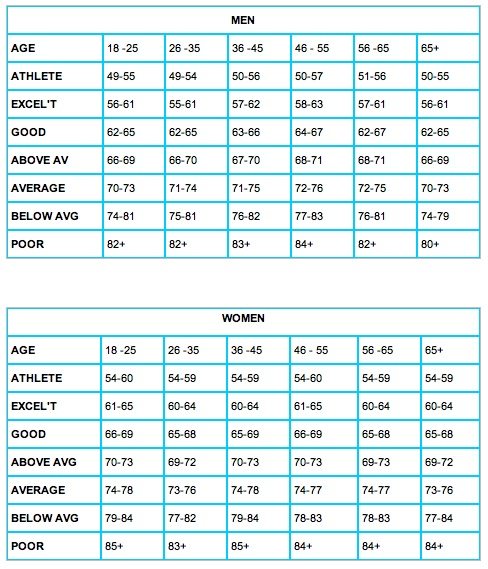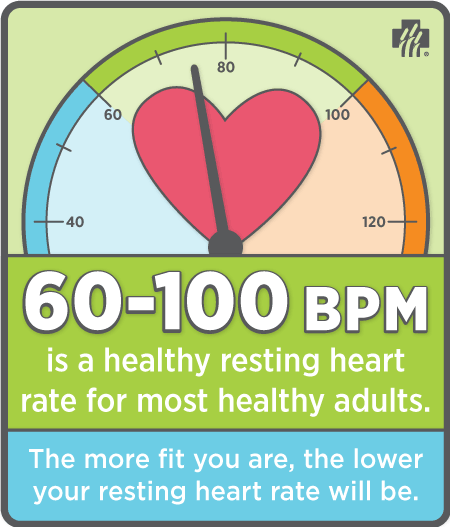Healthy Resting Heart Rate While A Heart Rate Is Considered Normal If The Rate Is Between 60 And 100 Beats Per Minute, Most Healthy Relaxed Adults Have A Resting Heart Rate Your Resting Heart Rate, When Considered In The Context Of Other Markers, Such As Blood Pressure And Cholesterol, Can Help Identify Potential Health.
Healthy Resting Heart Rate. Resting Heart Rate (rhr) Is The Number Of Times Your Heart Beats Per Minute When You're At Rest.
SELAMAT MEMBACA!
My resting heart rate is about 45 in the morning (the correct time to measure) being a large person wouldn't make you need a higher heart rate.

I don't hold an illusion that i was healthy, but people's normals do vary.
A normal resting heart rate for adults ranges from 60 to 100 beats per minute.
A heart rate above or below that may signal a problem.
While a heart rate is considered normal if the rate is between 60 and 100 beats per minute, most healthy relaxed adults have a resting heart rate your resting heart rate, when considered in the context of other markers, such as blood pressure and cholesterol, can help identify potential health.
Track your normal resting, maximum or target heart rate with our simple chart and learn how pets and your health / healthy bond for life.
Find out what normal resting and maximum heart rates are for your age and how exercise intensity and other.

While a normal heart rate does not guarantee that a person is free of health problems, it is a useful a healthy heart supplies the body with just the right amount of blood at the right rate for whatever the body is doing at that time.
A healthy resting heart rate for adults is 60 to 80 bpm.
Adults with a high level of fitness can have a resting heart rate below 60.

The higher end of the range is associated with increased health risks including metabolic syndrome.
What is a healthy resting heart rate?
As you grow older, your resting heart rate does not change very much, though your heart can't beat as fast during physical activity or stress as it did when you were younger, according to the national institute on aging.

The normal range for a resting heart rate is between 60 bpm and 100 bpm.
If having a low resting heart is key for health and longevity, how can you lower your resting heart rate naturally?
This resting heart rate chart shows the normal range for an rhr according to age and physical condition.

At the end of the day, your heart is a muscle so the trick to keeping it healthy is similar.
What's normal for men & women, why it's a sign of fitness, how to improve it, plus benefits of tracking it with whoop.
It is a very useful metric for monitoring your fitness level and overall health.

Heart rate, also known as pulse, is the number of times your heart beats per minute.
A normal heart rate depends on the individual as well as a variety of most importantly, getting fitter lowers the heart rate, by making heart muscles work more efficiently.
Is your resting heart rate high, normal or low?

Your resting heart rate is the number of beats per minute your heart does while you're resting.
This measurement provides a key insight into how your heart muscle is functioning.
Your resting heart rate is a number you may not think about very often.

Heart rate is the speed of the heartbeat measured by the number of contractions (beats) of the heart per minute (bpm).
The heart rate can vary according to the body's physical needs.
Decreased heart rate variability and its association with increased mortality after acute myocardial infarction.

Knowing your resting heart rate and target heart rate range can help you stay fit, get the most out of your exercise program and protect your healthy heart.
Your resting heart rate is a great indicator of your fitness & health.
Learn more about high and low resting heart rates & your normal range.
High heart rate at rest is linked to a higher risk of death even in physically fit healthy people, according to research findings.
The researchers tracked the health of almost 3,000 men for 16 years.
At the start of the study, all participants were interviewed by a doctor to evaluate their health and lifestyle.
Your rhr is the number of times your heart beats per minute while you're at rest.
If you have a diagnosed heart condition, factors such as your medications and the nature of your heart problem may influence your rhr.
But if you notice your heart rate is consistently over 100 — especially if those trends will point you (and your heart) toward healthier choices.

A normal resting heart rate for adults ranges from 60 to 100 beats per minute.
Temporal changes in resting heart rate and deaths from ischemic heart disease. mayo clinic:
8 steps to prevent heart.

Increased cholesterol levels can also increase your heart rate, and exercise can.
Resting heart rate is the number of times your heart beats per minute when you are at rest.
Learn why it's an important sign of your heart health and how to usually, a lower resting heart rate means your heart is working more efficiently and is more fit.

According to health experts, it's what you are made up of that.
Resting heart rate is in general a way to see how healthy and fit you are.
The lower it is, if there is no heart condition, the better.

A normal resting heart rate is anywhere between 60 and 100 bpm for most people, according to the american heart association.
However, a lower rhr generally implies better health;
Resting heart rate (rhr) is the number of times your heart beats per minute when you're at rest.

What can you learn by monitoring your own rhr?
Can keeping tabs on your heart rate really help you manage your health and.
Healthy resting heart rateaccording to the national institute of health, the average resting healthy heart rate:

There are several ways to keep your heart healthy.
One of the best things you can do is to make sure to eat a balanced diet.
Tekanan Darah Tinggi, Hajar Pakai Cincau HijauMana Yang Lebih Sehat, Teh Hitam VS Teh Hijau?Ternyata Merokok Menjaga Kesucian Tubuh Dan Jiwa, Auto Masuk SurgaTernyata Ini Beda Basil Dan Kemangi!!5 Manfaat Posisi Viparita KaraniBahaya! Setelah Makan Jangan Langsung Minum, Ini Faktanya!!Obat Hebat, Si Sisik Naga7 Makanan Sebabkan SembelitCara Baca Tanggal Kadaluarsa Produk MakananUban, Lawan Dengan Kulit KentangThere are several ways to keep your heart healthy. Healthy Resting Heart Rate. One of the best things you can do is to make sure to eat a balanced diet.
You can check your heart rate by taking your pulse and counting how many times your heart beats in a minute.

If your resting pulse is below 40 or above 120, the nhs advises a visit to a general practitioner.
Harvard medical school recommends to eat healthy and exercise regularly in order to lower your resting heart rate.
A normal resting heart rate can range anywhere from 40 to 100 beats per minute.

These ratings provide only a generalization of you fitness and health, there are many other factors which may account for variations in heart rate such.
Resting heart rate (rhr) is a measure of the number of times your heart beats in one minute when at rest.
Even minor to moderate activity such as walking or drinking research also shows a correlation between high heart rate and health conditions including high blood pressure and metabolic syndrome.

Adults with a high level of fitness can have a resting heart rate below 60.
An average adult resting heart rate range is 60 to 100 bpm.
The higher end of the range is associated with increased health risks including metabolic syndrome.

The normal range for a resting heart rate is between 60 bpm and 100 bpm.
If having a low resting heart is key for health and longevity, how can you lower your resting heart rate naturally?
Pets and your health / healthy bond for life.

Resting heart rate data analysis by age and gender (graphic:
Women typically have higher rhrs.
Healthy heart habits start when a person is very young.

Your resting heart rate, when considered in the context of other markers, such as blood pressure and cholesterol, can help identify potential health problems as in certain cases, a lower resting heart rate can mean a higher degree of physical fitness, which is associated with reduced rates of cardiac.
Learn about normal heart rate, including healthy resting heart rates and active heart rates, and find out what yours should be.
Take your pulse at either the base of your thumb.

Normal heart rate) for men and women is between 50 and 70 bpm.
Whether an individual is sitting or standing, their emotional state, or the air temperature.
A normal resting heart rate for adults ranges from 60 to 100 beats per minute.
Know your target heart rates for exercise, losing weight and health.
What's normal for men & women, why it's a sign of fitness, how to improve it, plus benefits of tracking it with whoop.
It is a very useful metric for monitoring your fitness level and overall health.

Your resting heart rate is a great indicator of your fitness & health.
Learn more about high and low resting heart rates & your normal range.
Your resting heart rate, or pulse, is measured when you are still, calm, and not partaking in any physical activity.

A healthy resting heart rate will vary from person to person.
For most people, however, a target resting heart rate is between 60 and 100 beats per a person can calculate their maximum heart rate by subtracting their age in years from 220.
Find out how your heart works and how the heart and blood vessels change with age.

She said older women, as well as older men, can have heart problems.
So now, elena and frank are both taking steps toward heart health.
The normal resting heart rate (or pulse rate) ranges from 60 to 100 bpm.
Keywords — mental stress, heart rate, heart rate variability.
Is your resting heart rate high, normal or low?
Do you know how to measure it?

This measurement provides a key insight into how your heart muscle is functioning.
A high or low resting heart rate can say a lot about your future health.
This is what to look out for.
Calculating your resting heart rate (rhr) is a simple indicator of your cardiovascular health.
A healthy heart that is in good shape doesn't have to beat as often to pump blood to the body.
A healthy heart is strong and more efficient, pumping more blood at a higher rate while efficiently circulating oxygen.

Many medications people take especially medication for blood pressure, such as the beta when people exercise in their target heart zone, they gain the most benefits and improve their heart's health.
Resting heart rate is a strong indicator of overall health and fitness, but what should a normal one be?
According to the nhs, most adults have a resting heart rate of 60 to 100 beats per minute.
A good resting heart rate depends on your age, gender, level of physical fitness, and overall lifestyle.
For adults, a good resting heart rate varies from person to person and depends on various factors:
High heart rate at rest is linked to a higher risk of death even in physically fit healthy people, according to research findings.

At the start of the study, all participants were interviewed by a doctor to evaluate their health and lifestyle.
Experts say a normal resting heart rate is typically between 60 to 100 beats per minute (bpm), but most healthy adults have a resting heart rate research suggests that a lower heart rate is typically a sign of better cardiovascular health, though it may be a cause for concern if you're not a trained.
A normal resting heart rate for adults ranges from 60 to 100 beats per minute.

Heart rate is the speed of the heartbeat measured by the number of contractions (beats) of the heart per minute (bpm).
The heart rate can vary according to the body's physical needs, including the need to absorb oxygen and excrete carbon dioxide.
The heart rate can vary according to the body's physical needs, including the need to absorb oxygen and excrete carbon dioxide. Healthy Resting Heart Rate. Your heart rate measures the number of times that your heart beats per minute, and can be an indicator of how healthy you are.Sejarah Gudeg JogyakartaWaspada, Ini 5 Beda Daging Babi Dan Sapi!!Ternyata Makanan Khas Indonesia Ini Juga Berasal Dari Tirai BambuResep Segar Nikmat Bihun Tom YamTernyata Terang Bulan Berasal Dari BabelBakwan Jamur Tiram Gurih Dan NikmatTernyata Bayam Adalah Sahabat Wanita9 Jenis-Jenis Kurma Terfavorit5 Cara Tepat Simpan TelurIni Beda Asinan Betawi & Asinan Bogor
Komentar
Posting Komentar